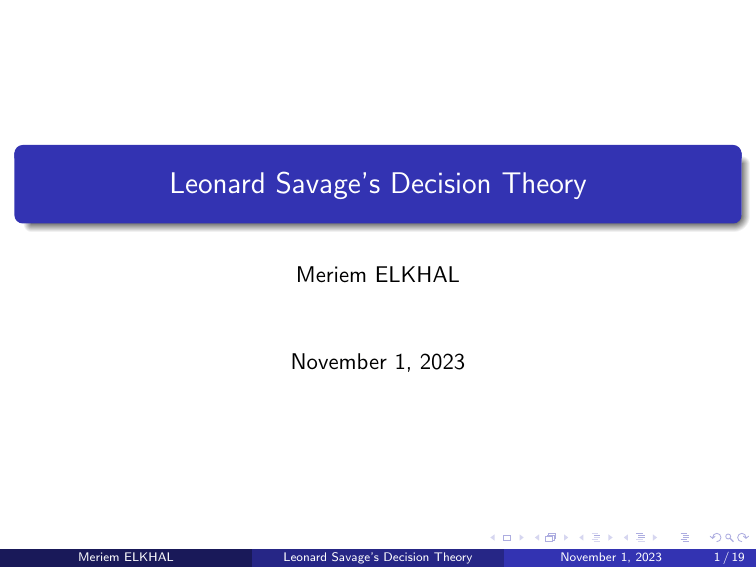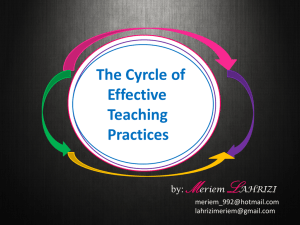
Leonard Savage’s Decision Theory Meriem ELKHAL November 1, 2023 Meriem ELKHAL Leonard Savage’s Decision Theory November 1, 2023 1 / 19 Introduction Decision-making is a vital responsibility for managers. Many decisions involve uncertainty, and managers need to choose the best option. Leonard Savage’s work has significantly contributed to understanding decision-making under uncertainty. Meriem ELKHAL Leonard Savage’s Decision Theory November 1, 2023 2 / 19 Who was Leonard Savage? Leonard Jimmie Savage (1917-1971) American mathematician and statistician Pioneer in the field of decision theory Meriem ELKHAL Leonard Savage’s Decision Theory November 1, 2023 3 / 19 Savage’s Contributions Leonard Savage made significant contributions to the field of decision theory, particularly in the context of decision-making under uncertainty. He introduced several key concepts and methodologies that continue to be influential in decision analysis. Some of his notable contributions include the development of the Expected Utility Theory and the concept of subjective probability. Meriem ELKHAL Leonard Savage’s Decision Theory November 1, 2023 4 / 19 Expected Utility Theory One of Leonard Savage’s most prominent contributions was the development of the Expected Utility Theory. This theory provides a framework for rational decision-making under uncertainty. It suggests that individuals make decisions by maximizing their expected utility, which combines the desirability of an outcome with the probability of that outcome occurring. Meriem ELKHAL Leonard Savage’s Decision Theory November 1, 2023 5 / 19 Subjective Probability Savage’s work emphasized the role of subjective probability in decision theory. He argued that individuals often lack objective data to estimate probabilities, so they rely on their personal beliefs and judgments. Subjective probability allows decision-makers to incorporate their own assessments of uncertainty into the decision-making process. Meriem ELKHAL Leonard Savage’s Decision Theory November 1, 2023 6 / 19 Decision Theory: Definition Decision theory is a process of selecting an act out of several available alternative courses of action judged to be the best action according to predetermined criteria. Its objective is to help decision-makers select the best course of action from available options. Meriem ELKHAL Leonard Savage’s Decision Theory November 1, 2023 7 / 19 Key Components in Decision Theory Decision Maker: The individual or group responsible for choosing the best course of action from the available alternatives. Courses of Action: These are the alternative strategies or actions available to the decision-maker. For example, the quantity of a particular stock to be ordered. States of Nature: These represent external events outside the decision-maker’s control that influence the success of a chosen action. For instance, market demand for a particular product. Payoff Values: Each combination of a course of action and state of nature is associated with a payoff, representing the net benefit to the decision-maker. Bayes’ Rule: Used to calculate payoffs for each combination of courses of action and states of nature. Regrets or Opportunity Loss: Regret measures the difference between the maximum possible profit for a state of nature and the actual profit obtained due to the decision. Meriem ELKHAL Leonard Savage’s Decision Theory November 1, 2023 8 / 19 Decision-Making Under Uncertainty In finance, decision-makers often face uncertainty with no historical data available to estimate probabilities. For example, when launching a new financial product, historical data may not be applicable. This lack of data leads to decision-making under uncertainty. Meriem ELKHAL Leonard Savage’s Decision Theory November 1, 2023 9 / 19 Minimax Regrets Criteria The Minimax Regrets Criteria, introduced by Leonard Savage, helps identify opportunity loss or regrets associated with each state of nature. It quantifies the difference between the maximum possible payoff for a state of nature and the actual payoff due to the chosen decision. Decision-makers aim to minimize regrets by choosing actions that result in the least amount of opportunity loss. Meriem ELKHAL Leonard Savage’s Decision Theory November 1, 2023 10 / 19 Minimax Regret Strategy in Finance The Minimax Regret Strategy is employed by risk-neutral decision-makers in finance who want to minimize their maximum regret. ’Regret’ is defined as the opportunity loss resulting from making the wrong financial decision. To implement this strategy, a table is constructed to show the size of regret, calculated as the difference between the maximum possible profit for a state of nature and the actual profit obtained due to the chosen financial decision. Meriem ELKHAL Leonard Savage’s Decision Theory November 1, 2023 11 / 19 Example: Minimax Regret Strategy in Finance Imagine a financial manager choosing where to invest money: in bonds, stocks, or mutual funds. We’re not sure about the economy, so we need to consider different scenarios. Let’s look at the profits in three different economic scenarios: growing economy, stable economy, declining economy. Meriem ELKHAL Leonard Savage’s Decision Theory November 1, 2023 12 / 19 Step 1: Create a Payoff Table Action Bonds Stocks Mutual Funds Meriem ELKHAL Growing 40 70 53 Stable 40 30 45 Leonard Savage’s Decision Theory Declining 5 -13 -5 November 1, 2023 13 / 19 Step 2: Create a Regret Table First, we calculate regrets for each action in each state of nature. Regret = Maximum possible profit - Actual profit Action Bonds Stocks Mutual Funds Meriem ELKHAL Growing 40 70 53 Stable 45 30 45 Leonard Savage’s Decision Theory Declining 5 -13 -5 November 1, 2023 14 / 19 Step 2: Create a Regret Table Action Bonds Stocks Mutual Funds Meriem ELKHAL Growing 70 - 40 = 30 70 - 70 = 0 70 - 53 = 17 Stable 45 - 45 = 0 45 - 30 = 15 45 - 45 = 0 Leonard Savage’s Decision Theory Declining 5-5=0 5 -(-13) = 18 5 -(-5) = 10 November 1, 2023 15 / 19 Step 3: Find the maximum regret Action Bonds Stocks Mutual Funds Meriem ELKHAL Growing 70 - 40 = 30 70 - 70 = 0 70 - 53 = 17 Stable 45 - 45 = 0 45 - 30 = 15 45 - 45 = 0 Declining 5-5=0 5 - (-13) = 18 5 - (-5) = 10 Leonard Savage’s Decision Theory Max Regret 30 18 17 November 1, 2023 16 / 19 Step 4: Minimize Maximum Regret The goal is to choose the action with the smallest maximum regret. In this example, the decision is to invest in mutual funds. Meriem ELKHAL Leonard Savage’s Decision Theory November 1, 2023 17 / 19 Conclusion Leonard Savage’s Decision Theory helps us make better financial decisions when we’re not sure about the outcomes. The Minimax Regret Strategy is a simple way to make decisions in finance while minimizing regret. Meriem ELKHAL Leonard Savage’s Decision Theory November 1, 2023 18 / 19 Conclusion Thank you! Meriem ELKHAL Leonard Savage’s Decision Theory November 1, 2023 19 / 19






![Avoiding Trafficked Labor [English]](http://s2.studylib.net/store/data/027039054_1-3047401815af88cce843a8404da043fb-300x300.png)